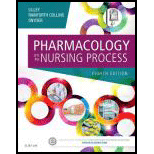
To describe:
The anatomy and physiology of the respiratory system.
Introduction:
The respiratory system consists of breathing organs that involve the exchange of air. It consists of a series of organs that perform the inhaling and exhaling of gases. Lungs are considered as the primary organs in the respiratory system. The main function of the respiratory system organs is to take oxygen and expel carbon dioxide. Oxygen is collected by the blood cells from the lungs and is transported to various parts of the body.
Explanation of Solution
The important function of the respiratory system is to take care of the intake of oxygen and remove the carbon dioxide from the cell. It requires the involvement of organs, tissues, and muscles to perform this function. The respiratory system consists of two divisions: the upper respiratory tract and the lower respiratory tract. Upper respiratory tract (URT): It is located in the thorax or the chest cavity. The URT is composed of structures such as the nose, oropharynx, larynx, and laryngopharynx. Lower respiratory tract (LRT): It is located within the thorax and is composed of the trachea, bronchial tree segments, and the lungs.
The four main accessory structures such as the rib cage, oral cavity, rib cage muscles, and the diaphragm of the upper and lower respiratory tracts involve the overall respiration function.
In the respiration process, the exchange of oxygen and carbon dioxide is performed across the alveolar semipermeable membrane. During this process, the oxygen is inhaled and carbon dioxide is exhaled from the lungs. The lungs are also used to warm, filter, and humidify the air. The inhaled oxygen from the lungs is delivered to the blood vessels of the circulatory system. The oxygen molecules are transferred to the red blood cells to carry out the cellular,
Thus, the anatomy of the respiratory system consists of the upper and lower respiratory tract, which involves gaseous exchange (with the help of the specialized structures).
Want to see more full solutions like this?
Chapter 37 Solutions
Pharmacology and the Nursing Process, 8e
- • Define shock and list types of shock • Discuss pathogenesis of septic shock. • Enumerate the stages of shock. • Define oedema and describe the pathophysiologic mechanisms of oedema with examples.arrow_forwardDiscuss Hypertension under the following headings: Definition Diagnosis Non-pharmacological intervention Drugs Classification Management of a Hypertensive emergencyarrow_forwardExplain how the answer could be 2 or 1.8 WITHOUT changing the questionarrow_forward
- overview of the neurological system, cranial nerves and what part of the body it innervatesarrow_forwarddifferentiate structure and function of the peripheral vascular system. what are the normal and abnormal findings of the peripheral arterioles and peripheral venous systemarrow_forwardAn overview of the skin, hair and nails epidermal appendages normal and abnormal findingsarrow_forward
- differentiate the twelve cranial nerves and how to test themarrow_forwardWhat are the nursing interventions for patients with GI problems ? What is the priority ?arrow_forwardAdult Nutrition Assessment Date of consultation: 3/2/25 Reason for Nutrition Assessment: Mrs. Clover was referred to the RD from the ER physician; patient experiencing weight loss, SOB & Edema Nutrition Assessment Data 69 YOF Ht 157 cm, Wt 53 kg. BMI 21.7 Usual wt 55 kg Heart: slight physiologic murmur; lungs: clear; extremities: 3+ edema to bilateral lower legs; elevated BP, abdomen: soft, nontender, active bowel sounds; neurologic: unremarkable; skin: diminished skin tugor. Biochemical Data BUN 72, Creatinine 4.6, Calcium 7.2, Phosphorus 7.3, glucose 105, BNP 720, Albumin 2.0, Na 125, K 3.3, CI 93. Hgb 11.5, Hct 33.2, ALT 29, AST 36, Alkaline phosphatase 120, other relevant labs pending result. Medications Include inhalers, Cymbalta, Neurontin, Seroquel, and topiramate, prilosec, solumedrol, rocephin, zithromax, NaCl 0.45%+50 MEQ sodium bicarbonate @100 ml/hr. No history of herbal supplements. Since her pneumonia diagnosis several days ago, she has felt too weak to prepare meals, she…arrow_forward
- Assuming you are a community health nurse, choose a community of your own and perform practically the following and report your findings: a. Community Assessment b. Community Diagnosisarrow_forwardDescribe practically how you would use a standing order in the diagnosis and treatment of a 10-year-old primary school pupil with a complaint of haematuria at the end of the urine.arrow_forwardSimple explanations, please. B. Why is an accurate diagnosis of malnutrition important? H. Is BMI a food indicator of malnutrition? I. Can an overweight/obese patient develop malnutrition? Why or why not?arrow_forward
 Phlebotomy EssentialsNursingISBN:9781451194524Author:Ruth McCall, Cathee M. Tankersley MT(ASCP)Publisher:JONES+BARTLETT PUBLISHERS, INC.
Phlebotomy EssentialsNursingISBN:9781451194524Author:Ruth McCall, Cathee M. Tankersley MT(ASCP)Publisher:JONES+BARTLETT PUBLISHERS, INC. Gould's Pathophysiology for the Health Profession...NursingISBN:9780323414425Author:Robert J Hubert BSPublisher:Saunders
Gould's Pathophysiology for the Health Profession...NursingISBN:9780323414425Author:Robert J Hubert BSPublisher:Saunders Fundamentals Of NursingNursingISBN:9781496362179Author:Taylor, Carol (carol R.), LYNN, Pamela (pamela Barbara), Bartlett, Jennifer L.Publisher:Wolters Kluwer,
Fundamentals Of NursingNursingISBN:9781496362179Author:Taylor, Carol (carol R.), LYNN, Pamela (pamela Barbara), Bartlett, Jennifer L.Publisher:Wolters Kluwer, Fundamentals of Nursing, 9eNursingISBN:9780323327404Author:Patricia A. Potter RN MSN PhD FAAN, Anne Griffin Perry RN EdD FAAN, Patricia Stockert RN BSN MS PhD, Amy Hall RN BSN MS PhD CNEPublisher:Elsevier Science
Fundamentals of Nursing, 9eNursingISBN:9780323327404Author:Patricia A. Potter RN MSN PhD FAAN, Anne Griffin Perry RN EdD FAAN, Patricia Stockert RN BSN MS PhD, Amy Hall RN BSN MS PhD CNEPublisher:Elsevier Science Study Guide for Gould's Pathophysiology for the H...NursingISBN:9780323414142Author:Hubert BS, Robert J; VanMeter PhD, Karin C.Publisher:Saunders
Study Guide for Gould's Pathophysiology for the H...NursingISBN:9780323414142Author:Hubert BS, Robert J; VanMeter PhD, Karin C.Publisher:Saunders Issues and Ethics in the Helping Professions (Min...NursingISBN:9781337406291Author:Gerald Corey, Marianne Schneider Corey, Cindy CoreyPublisher:Cengage Learning
Issues and Ethics in the Helping Professions (Min...NursingISBN:9781337406291Author:Gerald Corey, Marianne Schneider Corey, Cindy CoreyPublisher:Cengage Learning





